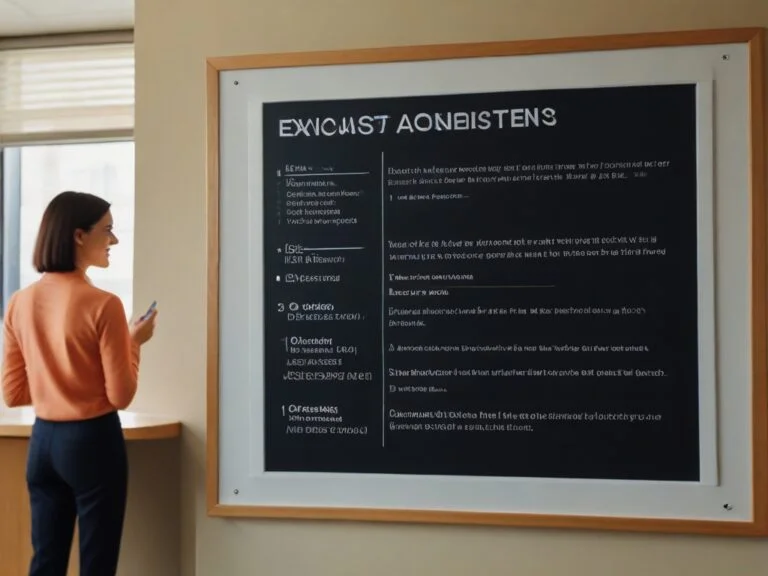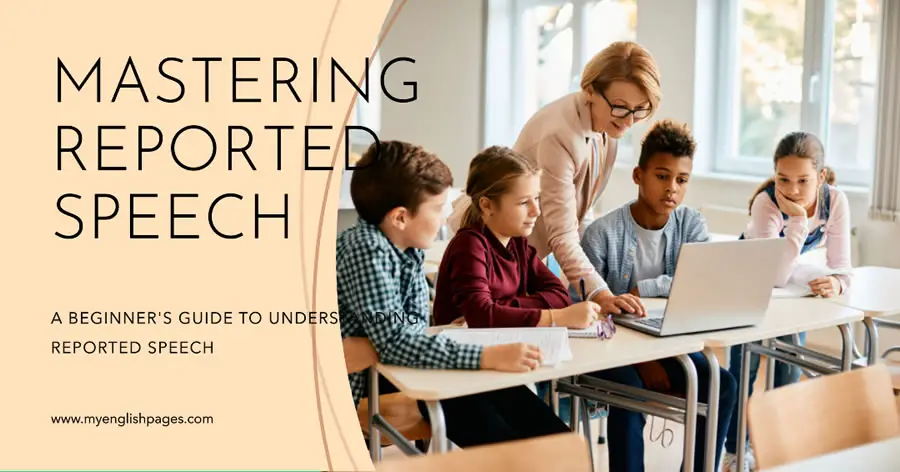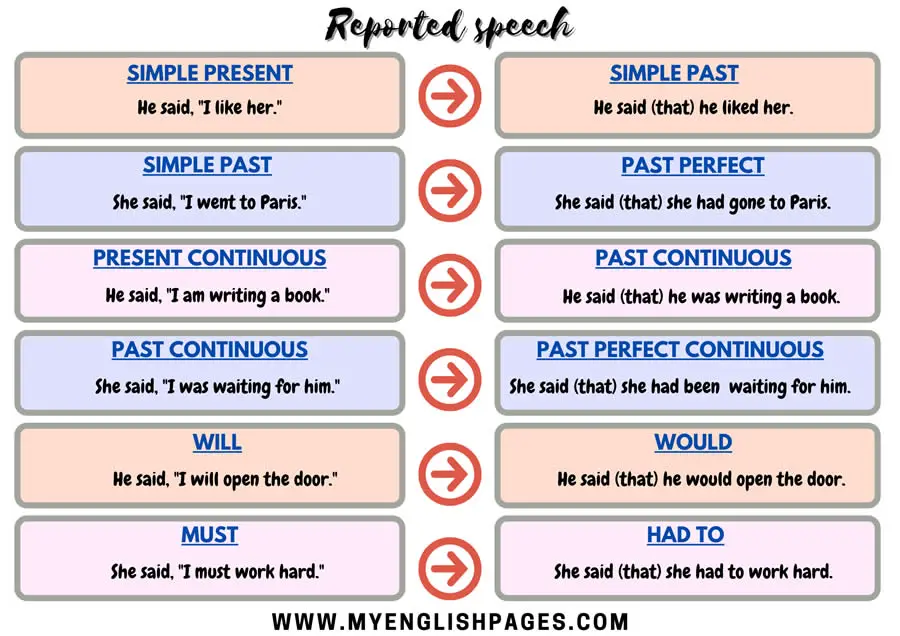
Reported speech

Tense changes in reported speech
Indirect speech (reported speech) focuses more on the content of what someone said rather than their exact words. In indirect speech, the structure of the reported clause depends on whether the speaker is reporting a statement, a question or a command.
Normally, the tense in reported speech is one tense back in time from the tense in direct speech: She said, "I am tired." = She said that she was tired.
You do not need to change the tense if the reporting verb is in the present, or if the original statement was about something that is still true (but this is only for things which are general facts, and even then usually we like to change the tense) , e.g.
- He says he has missed the train but he'll catch the next one.
- We explained that it is very difficult to find our house.
- Direct speech: The sky is blue.
- Reported speech: She said (that) the sky is/was blue.
These modal verbs do not change in reported speech: might, could, would, should, ought to :
- We explained, "It could be difficult to find our house." = We explained that it could be difficult to find our house.
- She said, "I might bring a friend to the party." = She said that she might bring a friend to the party.
Course Curriculum
- Changing time and place in reported speech 20 mins
- Direct and indirect speech 15 mins
- Tense changes in reported speech 20 mins
- Reported questions 20 mins
- Reporting verbs 20 mins
- Reporting orders and requests 15 mins
- Reporting hopes, intentions and promises 20 mins
REPORTED SPEECH

Reported Statements
Here's how it works:
We use a 'reporting verb' like 'say' or 'tell'. ( Click here for more about using 'say' and 'tell' .) If this verb is in the present tense, it's easy. We just put 'she says' and then the sentence:
- Direct speech: I like ice cream.
- Reported speech: She says (that) she likes ice cream.
We don't need to change the tense, though probably we do need to change the 'person' from 'I' to 'she', for example. We also may need to change words like 'my' and 'your'. (As I'm sure you know, often, we can choose if we want to use 'that' or not in English. I've put it in brackets () to show that it's optional. It's exactly the same if you use 'that' or if you don't use 'that'.)
But , if the reporting verb is in the past tense, then usually we change the tenses in the reported speech:
- Reported speech: She said (that) she liked ice cream.
* doesn't change.
- Direct speech: The sky is blue.
- Reported speech: She said (that) the sky is/was blue.
Click here for a mixed tense exercise about practise reported statements. Click here for a list of all the reported speech exercises.
Reported Questions
So now you have no problem with making reported speech from positive and negative sentences. But how about questions?
- Direct speech: Where do you live?
- Reported speech: She asked me where I lived.
- Direct speech: Where is Julie?
- Reported speech: She asked me where Julie was.
- Direct speech: Do you like chocolate?
- Reported speech: She asked me if I liked chocolate.
Click here to practise reported 'wh' questions. Click here to practise reported 'yes / no' questions. Reported Requests
There's more! What if someone asks you to do something (in a polite way)? For example:
- Direct speech: Close the window, please
- Or: Could you close the window please?
- Or: Would you mind closing the window please?
- Reported speech: She asked me to close the window.
- Direct speech: Please don't be late.
- Reported speech: She asked us not to be late.
Reported Orders
- Direct speech: Sit down!
- Reported speech: She told me to sit down.
- Click here for an exercise to practise reported requests and orders.
- Click here for an exercise about using 'say' and 'tell'.
- Click here for a list of all the reported speech exercises.
DO YOU WANT TO MASTER ENGLISH GRAMMAR?
Your logical way to teach is very easy to understand.
This is the best-structured and the most clear course I've ever seen.
It was easy to learn - you explained it perfectly.

Reported Speech: Important Grammar Rules and Examples
Reported speech is a very common aspect of the English language. You use it nearly every day, both in conversations and in writing. This reference covers key sections about reported speech, including what it is, examples, rules, and verb tense changes. You’ll also learn about modal verbs, changes in time and place, and different reporting verbs.
Reported Speech

What Is Reported Speech?
Reported speech is simply when you tell somebody what someone else said. You can do this in your writing, or in speech. Reported speech is very different from direct speech , which is when you show what somebody said in the exact way that they said it . In reported speech though, you do not need to quote somebody directly.
Instead, you use a reporting verb, such as ‘say’ or ‘ask’. These reporting verbs are used to report the speech to someone else. There are many different reporting verbs that can be used.
In short, reported speech is the linguistic technique that you use to tell somebody what someone else’s direct speech was. In reported speech though, you may need to make certain changes to the grammar to make the sentence make sense. Some examples below highlight what needs to be changed.
Reported Speech Examples
When using reported speech, you are usually talking about the past. The verbs, therefore, usually have to be in the past too.
For example :
- Direct speech: I’ve lost my umbrella .
- Reported speech: He said (that) he had lost his umbrella.
Another example :
- Direct speech: She is doing her homework .
- Reported speech: He said (that) she was doing her homework.
Table of Changes :
Reported Speech Rules
Verb tense changes in reported speech.
When the reporting verb is in the present tense, only small changes are needed.
- Direct speech: I like dogs.
- Reported speech: She says she likes dogs.
When the reporting verb is in the past tense, you need to change the tense of both the reporting verb and the main verb.
- Reported speech: She said she liked dogs.
The tenses generally move backward as follows:
For sentences about the future, you also need to change the future verbs.
- Direct speech: I shall leave in a moment.
- Reported speech: She said that she would leave in a moment.
Here are the changes for future tenses:
Modal Verbs and Reported Speech
Modal verbs also change when used in reported speech.
- Direct speech: Will I see you later?
- Reported speech: He asked if he would see me later.
Some modal verbs do not need to change tense because they fit naturally.
- Direct speech: I should go to the park.
- Reported speech: He told me he should go to the park.
Here are both correct and incorrect examples of reported speech for clarity:
- Reported speech: He told me he should go to the park.
- Reported speech: He said he should go to the park.
- Incorrect reported speech: He told he should go to the park.
- Incorrect reported speech: He said me he should go to the park.
To correct these:
- Add ‘me’: He told me he should go to the park.
- Remove ‘me’ or add ‘to’: He said he should go to the park or He said to me he should go to the park.
Direct and Indirect Speech
Changes in time and place in reported speech.
References to time and place often need to change when you use indirect speech. Here is a useful guide to these changes:
No Change in Verb Tenses in Reported Speech
In some cases, verb tenses do not change when you report speech indirectly. Here are the key instances:
- When the introductory verb is in the present , present perfect , or future .
- When the reported sentence deals with a fact or general truth .
- When the reported sentence contains a time clause .
- If the verb of the sentence is in the unreal past (the second or the third conditional ).
- The subjunctive stays unchanged in the subordinate clause .
- Had better , could , would , used to , should , might , ought to , and mustn’t remain unchanged.
- If the speaker reports something immediately or soon after it was said .
Reporting Verbs in Indirect Speech
Reporting verbs are crucial in indirect speech. Here is a list categorized by their usage:
- Basic Verbs : Tell, say, ask
- Verb + that + clause : Complain, deny, explain, exclaim, remark, promise, boast, inform somebody, claim, agree, suggest
- Verb + to + infinitive : Agree, offer, refuse, demand, threaten, promise, claim
- Verb + indirect object + to + infinitive : Advise, allow, beg, command, encourage, forbid, invite, want, instruct, permit, urge, order, remind, warn
- Verb + “ing” form : Admit (to), accuse somebody of, apologize for, boast about/of, complain to somebody of, deny, insist on, suggest
- Verb + how : Explain to somebody
Reported Questions
When converting questions from direct to indirect speech, you follow rules similar to those for statements. Verbs used include inquire, wonder, want to know, ask.
Reported Commands and Requests
Commands and requests in Indirect Speech are formed using the to-infinitive and not to-infinitive . Common reporting verbs include order, shout, demand, warn, beg, command, tell, insist, beseech , threaten, implore, ask, propose, forbid.
Pronoun and tense changes are needed when shifting from direct to indirect speech.
Reported Speech Video
- Latest Posts
- Active vs. Passive Voice Exercises – Active vs. Passive Voice Worksheet - December 25, 2023
- Phrase Exercises – Phrase Worksheet - December 23, 2023
- Sentence Exercises – Sentence Worksheet - December 23, 2023

Download Books
English To Hindu Dictionary
English Dictionary PDF
Idioms A to Z PDF
Basic Grammer book PDF
Tense Changes in Reported Speech: Rules, Examples, and Usage

Understanding Tense Changes in Reported Speech
Introduction: mastering tense changes in reported speech.
When we need to convey what someone else has said without quoting them directly, we use reported speech (also known as indirect speech). This often involves altering the original tense of the verbs used in the sentence. Understanding how to change tenses in reported speech correctly is crucial for effective communication, particularly when recounting past conversations or narrating events.
In reported speech, tense changes occur to reflect the shift in time from when the statement was made to when it is being reported. For instance, statements made in the present tense are usually reported in the past tense. This transformation helps to align the time frame of the original statement with the context in which it is being reported.
By the end of this lesson, you will understand the rules for changing tenses in reported speech, learn the various shifts from direct to reported speech, and gain practical examples that demonstrate these changes. This knowledge will enhance your English grammar skills, improve your written and spoken communication, and boost your confidence when relaying information accurately.
Useful Vocabulary for Tense Changes in Reported Speech
Here is a comprehensive guide to how different tenses change from direct to reported speech. Each section includes definitions, explanations, and examples to help you master the nuances of tense changes in reported speech.
Tense Changes in Reported Speech: Detailed Examples
- Direct : She said, "I like coffee." Reported : She said (that) she liked coffee.
- Direct : Tom said, "I play football every Saturday." Reported : Tom said (that) he played football every Saturday.
- Direct : They said, "We live in London." Reported : They said (that) they lived in London.
- Direct : He said, "She works hard." Reported : He said (that) she worked hard.
- Direct : Mary said, "I study English every day." Reported : Mary said (that) she studied English every day.
- Direct : She said, "I am reading a book." Reported : She said (that) she was reading a book.
- Direct : John said, "They are watching TV." Reported : John said (that) they were watching TV.
- Direct : He said, "We are going to the cinema." Reported : He said (that) they were going to the cinema.
- Direct : They said, "The children are playing in the garden." Reported : They said (that) the children were playing in the garden.
- Direct : The teacher said, "I am marking your tests now." Reported : The teacher said (that) she was marking our tests.
- Direct : He said, "I have finished my work." Reported : He said (that) he had finished his work.
- Direct : They said, "We have seen that movie." Reported : They said (that) they had seen that movie.
- Direct : She said, "I have never been to Paris." Reported : She said (that) she had never been to Paris.
- Direct : He said, "I have lost my keys." Reported : He said (that) he had lost his keys.
- Direct : Alice said, "I have already eaten breakfast." Reported : Alice said (that) she had already eaten breakfast.
- Direct : She said, "I met him yesterday." Reported : She said (that) she had met him the day before.
- Direct : They said, "We visited the museum last week." Reported : They said (that) they had visited the museum the previous week.
- Direct : He said, "I saw the movie last night." Reported : He said (that) he had seen the movie the previous night.
- Direct : John said, "I broke the vase." Reported : John said (that) he had broken the vase.
- Direct : The manager said, "I called you on Monday." Reported : The manager said (that) he had called me on Monday.
- Direct : He said, "I will call you tomorrow." Reported : He said (that) he would call me the next day.
- Direct : They said, "We will travel to Spain next year." Reported : They said (that) they would travel to Spain the following year.
- Direct : She said, "I will help you." Reported : She said (that) she would help me.
- Direct : Tom said, "I will fix the car." Reported : Tom said (that) he would fix the car.
- Direct : The doctor said, "I will see you next week." Reported : The doctor said (that) he would see me the next week.
- Direct : She said, "I can speak three languages." Reported : She said (that) she could speak three languages.
- Direct : They said, "We can finish the project by Monday." Reported : They said (that) they could finish the project by Monday.
- Direct : He said, "I can swim across the river." Reported : He said (that) he could swim across the river.
- Direct : John said, "I can solve this problem." Reported : John said (that) he could solve the problem.
- Direct : She said, "I can bake a cake." Reported : She said (that) she could bake a cake.
- Direct : She said, "I may go to the party." Reported : She said (that) she might go to the party.
- Direct : He said, "We may be late." Reported : He said (that) they might be late.
- Direct : They said, "It may snow tomorrow." Reported : They said (that) it might snow the next day.
- Direct : She said, "I may visit my grandmother." Reported : She said (that) she might visit her grandmother.
- Direct : The coach said, "The match may be cancelled." Reported : The coach said (that) the match might be cancelled.
- Direct : She said, "I must leave early." Reported : She said (that) she had to leave early.
- Direct : They said, "We must finish this today." Reported : They said (that) they had to finish it that day.
- Direct : He said, "You must listen carefully." Reported : He said (that) I had to listen carefully.
- Direct : She said, "I must complete the report." Reported : She said (that) she had to complete the report.
- Direct : The manager said, "You must follow the instructions." Reported : The manager said (that) we had to follow the instructions.
- Direct : He said, "I have to work late tonight." Reported : He said (that) he had to work late that night.
- Direct : They said, "We have to clean the house." Reported : They said (that) they had to clean the house.
- Direct : She said, "I have to attend the meeting." Reported : She said (that) she had to attend the meeting.
- Direct : John said, "I have to finish this by Friday." Reported : John said (that) he had to finish it by Friday.
- Direct : The supervisor said, "We have to improve our performance." Reported : The supervisor said (that) we had to improve our performance.
Lesson Summary: Tense Changes in Reported Speech
In this comprehensive lesson, we have explored how to convert various tenses from direct to reported speech. By mastering these tense changes, learners will be able to accurately report conversations, narratives, and past events.
Key Phrases Learnt:
Learners have encountered key tense changes such as moving from "present simple" to "past simple," "will" to "would," and "must" to "had to." These changes are essential for ensuring that reported speech is accurate and grammatically correct.
Practice Exercises:
Encourage learners to practise converting direct speech to reported speech by using daily conversations, creating dialogues, and writing journal entries. Recording your sentences and reviewing the tense shifts can also help reinforce learning.
Tips for Remembering:
Break down tense changes into smaller steps, use flashcards with examples of tense shifts, and practice regularly. Associating tense changes with real-life scenarios can make it easier to recall the rules.
Further Lessons:
Explore more grammar lessons and resources on learningenglishfree.co.uk to deepen your understanding of English grammar, including tense usage, reported speech, and more.
Latest Lessons
Fitness challenges to try at home: stay active and achieve your goals, the history of boxing: from ancient times to now, fitness challenges to try at home: boost your health and confidence 💪, how to write an impressive english essay: a step-by-step guide, commonly confused word pairs in english: definitions, differences, and tips to remember, understanding english tenses: a beginner’s guide.

Ronald Kaunda
Reported Speech: A Comprehensive Guide with Clear Examples
Learn the rules and intricacies of reported speech with our detailed guide. Understand how to convert direct speech into indirect speech, master tense changes, and explore examples of reported questions, commands, and modal verbs. Perfect for students and educators alike!

Reported speech is the way we communicate what someone else has said. It allows us to convey information from other speakers, either by using their precise wording (Direct Speech) or by modifying it to suit our context (Indirect Speech).
Understanding the difference between direct and indirect speech is essential for clear communication in both written and spoken language.
This guide will explore both forms, key rules for changing tenses, pronouns , and time expressions, and provide examples for reporting statements , questions, commands, and modal verbs .

Direct Speech
Direct Speech involves quoting the speaker’s exact words, enclosed in quotation marks. A reporting verb such as said , told , or asked introduces the speech. This method is typically used when we want to capture the speaker’s original tone, phrasing, or emotion.
Structure of Direct Speech:
- Subject + Reporting Verb + Quotation Marks (” “)
- The first letter inside the quotation marks is always capitalized.
- Mwansa said, “I didn’t find the house I was looking for in Mansa.”
- “I’m going to the cinema tonight,” John said.
- The teacher said, “You have done a great job in your assignments.”
In the above examples, the original words are preserved exactly, including tense and pronouns. This makes it useful for storytelling, dialogue, or quoting someone verbatim.
Shop laptop & School bags
Check out top-quality laptops and stylish school bags at Zed PCs – perfect for work, study, and on-the-go convenience! Shop now and find unbeatable deals on the essentials you need. For more information, don’t hesitate to get in touch with the website directly. Come one, come all.
Positions of Reporting Verbs in Direct Speech
In direct speech, reporting verbs such as say , ask , reply , shout , and explain indicate the action of speaking.
The placement of these verbs can vary, appearing at the beginning , middle , or end of the quoted text.
Each position affects the flow and rhythm of the sentence. Below is a detailed explanation of the three positions, along with more examples.
1. Beginning Position
The reporting verb introduces the quoted speech, establishing the context before the words are spoken. This position is formal and common in narrative writing.
- He said , “We need to leave early tomorrow.”
- She explained , “The project must be submitted by Friday.”
- The teacher asked , “Did you finish your homework?”
- They shouted , “Watch out for the car!”
This structure helps the reader or listener understand who is speaking before they focus on the actual words spoken.
2. Middle Position
The reporting verb appears between two parts of the speech, breaking the quote into two segments. This structure mimics natural dialogue, creating pauses and maintaining a conversational tone.
- “I think,” he said , “that we should go to the meeting.”
- “This is wonderful news,” she exclaimed , “and I can’t wait to share it with everyone.”
- “If you need help,” the teacher offered , “feel free to ask me.”
- “We can’t continue like this,” she added , “unless we get more support.”
Using this position can convey emotions like hesitation, excitement, or interruption, adding depth to the speech.
3. End Position
In this structure, the quoted speech comes first, followed by the reporting verb. This format is often used in brief dialogues to keep the focus on the words spoken. It is common in informal writing or when the speaker’s identity is already implied.
- “Let’s meet at 3 PM,” John suggested .
- “I don’t agree with that,” she replied .
- “I’m sorry for being late,” he apologized .
- “Are you coming with us?” they asked .
This position emphasizes the speech itself, with the reporting verb confirming who said it after the fact.
Indirect Speech
Indirect Speech is a way of reporting what someone said without quoting them directly. Instead of repeating the exact words, we convey the meaning by paraphrasing or rephrasing the original statement to fit the perspective of the new speaker.
This often involves changes to pronouns, verb tenses, and expressions of time or place to reflect the new context in which the speech is reported. Understanding these transformations is essential to accurately convey the speaker’s intended meaning in indirect speech.
Key Characteristics of Indirect Speech
No quotation marks are used.
Unlike direct speech, indirect speech does not use quotation marks. Instead, it embeds the reported statement within a sentence using a conjunction like “that” or phrases such as “if” or “whether” for reported questions.
- Direct Speech: Sarah said, “I am happy.”
- Indirect Speech: Sarah said that she was happy.
Tense Changes (Backshifting)
In most cases, the tense of the verbs in the original statement is shifted backwards (backshifting) to reflect that the speech occurred in the past. This ensures consistency between the time of speaking and the time of reporting.
- Present simple → Past simple “I work hard,” she said. → She said that she worked hard.
- Present continuous → Past continuous “I am studying,” he said. → He said that he was studying .
- Past simple → Past perfect “I visited Paris,” he said. → He said that he had visited Paris.
- Will → Would “I will call you,” she said. → She said that she would call me.
Exceptions: If the reported speech refers to a general truth or fact, the tense may not change.
“The sun rises in the east,” the teacher said. → The teacher said that the sun rises in the east.
Pronoun Change
Pronouns in indirect speech must be adjusted to fit the new speaker or subject’s point of view. The reporting speaker must alter first and second-person pronouns to third person (unless the new subject remains the same).
Therefore, pronouns change depending on the speaker and listener involved in the conversation. Below is an example to illustrate:
Direct: “I am happy to help you,” he said. Indirect: He said that he was happy to help me.
In the indirect version, I changes to he to reflect the new perspective, and you becomes me because the speech is now reported to a different person.
Time and Place Expressions
Time and place expressions often change to reflect the shift from the original moment of speech to the time of reporting. Here are common transformations:
- Now → Then “I am leaving now,” he said. → He said that he was leaving then .
- Today → That day “We will meet today,” she said. → She said that they would meet that day .
- Tomorrow → The next day / The following day “I will call you tomorrow,” he said. → He said that he would call me the next day .
- Yesterday → The day before / The previous day “I saw him yesterday,” she said. → She said that she had seen him the day before .
- Here → There “I am staying here,” he said. → He said that he was staying there .
- This → That “This is my favorite book,” she said. → She said that that was her favorite book.
Reporting Questions
When reporting questions, we need to follow these specific rules:
- The question format changes to a statement structure .
- We use if or whether to report yes/no questions .
- Wh- questions retain the question word but are converted into statements.
Reporting Yes/No Questions
When a yes/no question is reported, we introduce the reported speech with if or whether .
Examples: Direct: “Do you live in Lusaka?” he asked. Indirect: He asked if I lived in Lusaka.
Direct: “Can you help me with this problem?” he asked. Indirect: He asked if I could help him with that problem.
Reporting Wh- Questions
For wh- questions, we keep the question word (e.g., where , why , how ), but the sentence structure becomes declarative.
Examples: Direct: “Where are you going?” she asked. Indirect: She asked where I was going.
Direct: “Why did you miss the class?” the teacher asked. Indirect: The teacher asked why I had missed the class.
Reporting Imperatives and Requests
When reporting commands, orders, or requests , we typically use the verbs told or asked followed by the infinitive form of the verb.
Positive Imperatives
Examples: Direct: “Close the door!” she said. Indirect: She told me to close the door.
Direct: “Please help me with this task,” he said. Indirect: He asked me to help him with that task.
Negative Imperatives
For negative commands or requests, we use not before the infinitive.
Examples: Direct: “Don’t talk during the movie,” she said. Indirect: She told us not to talk during the movie.
Direct: “Don’t touch the exhibits,” the guide said. Indirect: The guide told us not to touch the exhibits.
Reporting Modal Verbs
When reporting sentences with modal verbs , some modals change, while others remain the same. Below are common changes:
Mastering reported speech requires a clear understanding of how to change tenses, pronouns, and time expressions to fit the context of the reporting.
Whether conveying statements, questions, commands, or requests, these adjustments ensure accurate communication of what was originally said.
By applying these rules, we can effectively relay information without ambiguity, maintaining both clarity and precision in our speech.
Similar Posts

Result Clauses: The Ultimate Guide to Boost Your Exam Scores Instantly!
Discover what result clauses are in English grammar, how they connect actions to outcomes, and learn to use them effectively in sentences. Ideal for improving your language skills and writing clarity.

Avoid These Grammar Mistakes: Master English Rules to Stop Sounding Unprofessional!
Discover grammar and some rules that can transform your language skills overnight and help you sound smarter, write better, and speak confidently.

What Is an Adverb? Simple Definition, Types & Examples
Master the use of adverbs in English grammar with this comprehensive guide. Explore adverbs of manner, time, place, degree, and frequency, complete with detailed explanations and examples.

8 Effective Ways to Express Reason in English: A Guide to Essential Conjunctions and Phrases
Discover 8 ways to clearly express reason in English with our comprehensive guide. Learn the essential structures like ‘because,’ ‘as,’ and ‘due to,’ along with practical examples to enhance your communication skills. Master the art of explaining reasons effectively in both writing and speaking

Phrasal Verbs Made Easy: Crush Confusion and Boost Your Fluency
Learn about English phrasal verbs with this focused guide. Learn about their structure, common examples, and tips for effective learning. Perfect for anyone looking to improve their English by understanding and using phrasal verbs confidently.

Question Tags Simplified: Meaning, Definition and How to Use with Examples
Learn how to master question tags with our comprehensive guide! From formation rules to special cases, we break down everything you need to know to enhance your English conversations and sound more fluent.
Leave a Reply Cancel reply
Your email address will not be published. Required fields are marked *
Save my name, email, and website in this browser for the next time I comment.

What are Intensifiers? Definitions and Examples (An Ultimate Guide)
© 2024 Ronald Kaunda. All Rights Researved.
Username or Email Address
Remember Me
Lost your password?
Don't have an account yet? Sign up
Reported Speech – Rules, Examples
| Candace Osmond
Candace Osmond
Candace Osmond studied Advanced Writing & Editing Essentials at MHC. She’s been an International and USA TODAY Bestselling Author for over a decade. And she’s worked as an Editor for several mid-sized publications. Candace has a keen eye for content editing and a high degree of expertise in Fiction.
They say gossip is a natural part of human life. That’s why language has evolved to develop grammatical rules about the “he said” and “she said” statements. We call them reported speech.
Every time we use reported speech in English, we are talking about something said by someone else in the past. Thinking about it brings me back to high school, when reported speech was the main form of language!
Learn all about the definition, rules, and examples of reported speech as I go over everything. I also included a worksheet at the end of the article so you can test your knowledge of the topic.
What Does Reported Speech Mean?

Reported speech is a term we use when telling someone what another person said. You can do this while speaking or writing.
There are two kinds of reported speech you can use: direct speech and indirect speech. I’ll break each down for you.
A direct speech sentence mentions the exact words the other person said. For example:
- Kryz said, “These are all my necklaces.”
Indirect speech changes the original speaker’s words. For example:
- Kryz said those were all her necklaces.
When we tell someone what another individual said, we use reporting verbs like told, asked, convinced, persuaded, and said. We also change the first-person figure in the quotation into the third-person speaker.
Reported Speech Examples
We usually talk about the past every time we use reported speech. That’s because the time of speaking is already done. For example:
- Direct speech: The employer asked me, “Do you have experience with people in the corporate setting?”
Indirect speech: The employer asked me if I had experience with people in the corporate setting.
- Direct speech: “I’m working on my thesis,” I told James.
Indirect speech: I told James that I was working on my thesis.
Reported Speech Structure
A speech report has two parts: the reporting clause and the reported clause. Read the example below:
- Harry said, “You need to help me.”
The reporting clause here is William said. Meanwhile, the reported clause is the 2nd clause, which is I need your help.
What are the 4 Types of Reported Speech?
Aside from direct and indirect, reported speech can also be divided into four. The four types of reported speech are similar to the kinds of sentences: imperative, interrogative, exclamatory, and declarative.
Reported Speech Rules
The rules for reported speech can be complex. But with enough practice, you’ll be able to master them all.
Choose Whether to Use That or If
The most common conjunction in reported speech is that. You can say, “My aunt says she’s outside,” or “My aunt says that she’s outside.”
Use if when you’re reporting a yes-no question. For example:
- Direct speech: “Are you coming with us?”
Indirect speech: She asked if she was coming with them.
Verb Tense Changes
Change the reporting verb into its past form if the statement is irrelevant now. Remember that some of these words are irregular verbs, meaning they don’t follow the typical -d or -ed pattern. For example:
- Direct speech: I dislike fried chicken.
Reported speech: She said she disliked fried chicken.
Note how the main verb in the reported statement is also in the past tense verb form.
Use the simple present tense in your indirect speech if the initial words remain relevant at the time of reporting. This verb tense also works if the report is something someone would repeat. For example:
- Slater says they’re opening a restaurant soon.
- Maya says she likes dogs.
This rule proves that the choice of verb tense is not a black-and-white question. The reporter needs to analyze the context of the action.
Move the tense backward when the reporting verb is in the past tense. That means:
- Present simple becomes past simple.
- Present perfect becomes past perfect.
- Present continuous becomes past continuous.
- Past simple becomes past perfect.
- Past continuous becomes past perfect continuous.
Here are some examples:
- The singer has left the building. (present perfect)
He said that the singers had left the building. (past perfect)
- Her sister gave her new shows. (past simple)
- She said that her sister had given her new shoes. (past perfect)
If the original speaker is discussing the future, change the tense of the reporting verb into the past form. There’ll also be a change in the auxiliary verbs.
- Will or shall becomes would.
- Will be becomes would be.
- Will have been becomes would have been.
- Will have becomes would have.
For example:
- Direct speech: “I will be there in a moment.”
Indirect speech: She said that she would be there in a moment.
Do not change the verb tenses in indirect speech when the sentence has a time clause. This rule applies when the introductory verb is in the future, present, and present perfect. Here are other conditions where you must not change the tense:
- If the sentence is a fact or generally true.
- If the sentence’s verb is in the unreal past (using second or third conditional).
- If the original speaker reports something right away.
- Do not change had better, would, used to, could, might, etc.
Changes in Place and Time Reference
Changing the place and time adverb when using indirect speech is essential. For example, now becomes then and today becomes that day. Here are more transformations in adverbs of time and places.
- This – that.
- These – those.
- Now – then.
- Here – there.
- Tomorrow – the next/following day.
- Two weeks ago – two weeks before.
- Yesterday – the day before.
Here are some examples.
- Direct speech: “I am baking cookies now.”
Indirect speech: He said he was baking cookies then.
- Direct speech: “Myra went here yesterday.”
Indirect speech: She said Myra went there the day before.
- Direct speech: “I will go to the market tomorrow.”
Indirect speech: She said she would go to the market the next day.
Using Modals

If the direct speech contains a modal verb, make sure to change them accordingly.
- Will becomes would
- Can becomes could
- Shall becomes should or would.
- Direct speech: “Will you come to the ball with me?”
Indirect speech: He asked if he would come to the ball with me.
- Direct speech: “Gina can inspect the room tomorrow because she’s free.”
Indirect speech: He said Gina could inspect the room the next day because she’s free.
However, sometimes, the modal verb should does not change grammatically. For example:
- Direct speech: “He should go to the park.”
Indirect speech: She said that he should go to the park.
Imperative Sentences
To change an imperative sentence into a reported indirect sentence, use to for imperative and not to for negative sentences. Never use the word that in your indirect speech. Another rule is to remove the word please . Instead, say request or say. For example:
- “Please don’t interrupt the event,” said the host.
The host requested them not to interrupt the event.
- Jonah told her, “Be careful.”
- Jonah ordered her to be careful.
Reported Questions
When reporting a direct question, I would use verbs like inquire, wonder, ask, etc. Remember that we don’t use a question mark or exclamation mark for reports of questions. Below is an example I made of how to change question forms.
- Incorrect: He asked me where I live?
Correct: He asked me where I live.
Here’s another example. The first sentence uses direct speech in a present simple question form, while the second is the reported speech.
- Where do you live?
She asked me where I live.
Wrapping Up Reported Speech
My guide has shown you an explanation of reported statements in English. Do you have a better grasp on how to use it now?
Reported speech refers to something that someone else said. It contains a subject, reporting verb, and a reported cause.
Don’t forget my rules for using reported speech. Practice the correct verb tense, modal verbs, time expressions, and place references.
Grammarist is a participant in the Amazon Services LLC Associates Program, an affiliate advertising program designed to provide a means for sites to earn advertising fees by advertising and linking to Amazon.com. When you buy via the links on our site, we may earn an affiliate commission at no cost to you.
2024 © Grammarist, a Found First Marketing company. All rights reserved.

The Reported Speech

Table of Contents
What is reported speech.
Reported speech is when you tell somebody what you or another person said before. When reporting a speech, some changes are necessary.
For example, the statement:
- Jane said she was waiting for her mom .
is a reported speech, whereas:
- Jane said, “I’m waiting for my mom.”
is a direct speech.
Reported speech is also referred to as indirect speech or indirect discourse .

Before explaining how to report a discourse, let us first distinguish between direct speech and reported speech .
Direct speech vs reported speech
1. We use direct speech to quote a speaker’s exact words. We put their words within quotation marks. We add a reporting verb such as “he said” or “she asked” before or after the quote.
- He said, “I am happy.”
2. Reported speech is a way of reporting what someone said without using quotation marks. We do not necessarily report the speaker”‘s exact words. Some changes are necessary: the time expressions, the tense of the verbs, and the demonstratives.
- He said that he was happy.
More examples:
Different types of reported speech
When you use reported speech, you either report:
- Requests/commands
- Other types
A. Reporting statements
When transforming statements, check whether you have to change:
- place and time expression
1- Pronouns
In reported speech, you often have to change the pronoun depending on who says what.
She says, “My dad likes roast chicken.” => She says that her dad likes roast chicken.
- If the sentence starts in the present, there is no backshift of tenses in reported speech.
- If the sentence starts in the past, there is often a backshift of tenses in reported speech.
No backshift
Do not change the tense if the introductory clause (i.e., the reporting verb) is in the present tense (e. g. He says ). Note, however, that you might have to change the form of the present tense verb (3rd person singular).
- He says, “I write poems.” => He says that he writes English.
You must change the tense if the introductory clause (i.e., the reporting verb) is in the past tense (e. g. He said ).
- He said, “I am happy.”=> He said that he was happy.
Examples of the main changes in verb tense :
3. Modal verbs
The modal verbs could, should, would, might, needn’t, ought to, and used to do not normally change.
- He said: “She might be right.” => He said that she might be right.
- He told her: “You needn’t see a doctor.” => He told her that she needn’t see a doctor.
Other modal verbs such as can, shall, will, must, and ma y change:
4- Place, demonstratives, and time expressions
Place, demonstratives, and time expressions change if the context of the reported statement (i.e. the location and/or the period of time) is different from that of the direct speech.
In the following table, you will find the different changes of place; demonstratives, and time expressions.
B. Reporting Questions
When transforming questions, check whether you have to change:
- The pronouns
- The place and time expressions
- The tenses (backshift)
Also, note that you have to:
- transform the question into an indirect question
- use the question word ( where, when, what, how ) or if / whether
>> EXERCISE ON REPORTING QUESTIONS <<
C. Reporting requests/commands
When transforming requests and commands, check whether you have to change:
- place and time expressions
- She said, “Sit down.” – She asked me to sit down.
- She said, “don’t be lazy” – She asked me not to be lazy
D. Other transformations
- Expressions of advice with must , should, and ought are usually reported using advise / urge . Example: “You must read this book.” He advised/urged me to read that book.
- The expression let’s is usually reported using suggest . In this case, there are two possibilities for reported speech: gerund or statement with should . Example : “Let’s go to the cinema.” 1. He suggested going to the cinema. 2. He suggested that we should go to the cinema.
Main clauses connected with and/but
If two complete main clauses are connected with and or but , put that after the conjunction.
- He said, “I saw her but she didn’t see me.=> He said that he had seen her but that she hadn’t seen him.
If the subject is dropped in the second main clause (the conjunction is followed by a verb), do not use that .
- She said, “I am a nurse and work in a hospital.=> He said that she was a nurse and worked in a hospital.
punctuation rules of the reported speech
Direct speech:
We normally add a comma between the reporting verbs (e.g., she/he said, reported, he replied, etc.) and the reported clause in direct speech. The original speaker”s words are put between inverted commas, either single (“…”) or double (“…”).
- She said, “I wasn’t ready for the competition”.
Note that we insert the comma within the inverted commas if the reported clause comes first:
- “I wasn’t ready for the competition,” she said.
Indirect speech:
In indirect speech, we don’t put a comma between the reporting verb and the reported clause and we omit the inverted quotes.
- She said that she hadn’t been ready for the competition.
In reported questions and exclamations, we remove the question mark and the exclamation mark.
- She asked him why he looked sad?
- She asked him why he looked sad.
Can we omit that in the reported speech?
Yes, we can omit that after reporting verbs such as he said , he replied , she suggested , etc.
- He said that he could do it. – He said he could do it.
- She replied that she was fed up with his misbehavior. – She replied she was fed up with his misbehavior.
List of reporting verbs
Reported speech requires a reporting verb such as “he said”, she “replied”, etc.
Here is a list of some common reporting verbs:
- Cry (meaning shout)
- Demonstrate
- Hypothesize
- Posit the view that
- Question the view that
- Want to know
In reported speech, we put the words of a speaker in a subordinate clause introduced by a reporting verb such as – “ he said ” and “ she asked “- with the required person and tense adjustments.
Related pages
- Reported speech exercise (mixed)
- Reported speech exercise (questions)
- Reported speech exercise (requests and commands)
- Reported speech lesson

Reported Speech: Rules, Examples, Exceptions

👉 Quiz 1 / Quiz 2
Advanced Grammar Course
What is reported speech?
“Reported speech” is when we talk about what somebody else said – for example:
- Direct Speech: “I’ve been to London three times.”
- Reported Speech: She said she’d been to London three times.
There are a lot of tricky little details to remember, but don’t worry, I’ll explain them and we’ll see lots of examples. The lesson will have three parts – we’ll start by looking at statements in reported speech, and then we’ll learn about some exceptions to the rules, and finally we’ll cover reported questions, requests, and commands.

So much of English grammar – like this topic, reported speech – can be confusing, hard to understand, and even harder to use correctly. I can help you learn grammar easily and use it confidently inside my Advanced English Grammar Course.
In this course, I will make even the most difficult parts of English grammar clear to you – and there are lots of opportunities for you to practice!

Backshift of Verb Tenses in Reported Speech
When we use reported speech, we often change the verb tense backwards in time. This can be called “backshift.”
Here are some examples in different verb tenses:
Reported Speech (Part 1) Quiz
Exceptions to backshift in reported speech.
Now that you know some of the reported speech rules about backshift, let’s learn some exceptions.
There are two situations in which we do NOT need to change the verb tense.
No backshift needed when the situation is still true
For example, if someone says “I have three children” (direct speech) then we would say “He said he has three children” because the situation continues to be true.
If I tell you “I live in the United States” (direct speech) then you could tell someone else “She said she lives in the United States” (that’s reported speech) because it is still true.
When the situation is still true, then we don’t need to backshift the verb.

But when the situation is NOT still true, then we DO need to backshift the verb.
Imagine your friend says, “I have a headache.”
- If you immediately go and talk to another friend, you could say, “She said she has a headache,” because the situation is still true
- If you’re talking about that conversation a month after it happened, then you would say, “She said she had a headache,” because it’s no longer true.
No backshift needed when the situation is still in the future
We also don’t need to backshift to the verb when somebody said something about the future, and the event is still in the future.
Here’s an example:
- On Monday, my friend said, “I ‘ll call you on Friday .”
- “She said she ‘ll call me on Friday”, because Friday is still in the future from now.
- It is also possible to say, “She said she ‘d (she would) call me on Friday.”
- Both of them are correct, so the backshift in this case is optional.
Let’s look at a different situation:
- On Monday, my friend said, “I ‘ll call you on Tuesday .”
- “She said she ‘d call me on Tuesday.” I must backshift because the event is NOT still in the future.

Review: Reported Speech, Backshift, & Exceptions
Quick review:
- Normally in reported speech we backshift the verb, we put it in a verb tense that’s a little bit further in the past.
- when the situation is still true
- when the situation is still in the future

Reported Requests, Orders, and Questions
Those were the rules for reported statements, just regular sentences.
What about reported speech for questions, requests, and orders?
For reported requests, we use “asked (someone) to do something”:
- “Please make a copy of this report.” (direct speech)
- She asked me to make a copy of the report. (reported speech)
For reported orders, we use “told (someone) to do something:”
- “Go to the bank.” (direct speech)
- “He told me to go to the bank.” (reported speech)
The main verb stays in the infinitive with “to”:
- She asked me to make a copy of the report. She asked me make a copy of the report.
- He told me to go to the bank. He told me go to the bank.
For yes/no questions, we use “asked if” and “wanted to know if” in reported speech.
- “Are you coming to the party?” (direct)
- He asked if I was coming to the party. (reported)
- “Did you turn off the TV?” (direct)
- She wanted to know if I had turned off the TV.” (reported)
The main verb changes and back shifts according to the rules and exceptions we learned earlier.
Notice that we don’t use do/does/did in the reported question:
- She wanted to know did I turn off the TV.
- She wanted to know if I had turned off the TV.
For other questions that are not yes/no questions, we use asked/wanted to know (without “if”):
- “When was the company founded?” (direct)
- She asked when the company was founded.” (reported)
- “What kind of car do you drive?” (direct)
- He wanted to know what kind of car I drive. (reported)
Again, notice that we don’t use do/does/did in reported questions:
- “Where does he work?”
- She wanted to know where does he work.
- She wanted to know where he works.
Also, in questions with the verb “to be,” the word order changes in the reported question:
- “Where were you born?” ([to be] + subject)
- He asked where I was born. (subject + [to be])
- He asked where was I born.

Reported Speech (Part 2) Quiz
Learn more about reported speech:
- Reported speech: Perfect English Grammar
- Reported speech: BJYU’s
If you want to take your English grammar to the next level, then my Advanced English Grammar Course is for you! It will help you master the details of the English language, with clear explanations of essential grammar topics, and lots of practice. I hope to see you inside!
I’ve got one last little exercise for you, and that is to write sentences using reported speech. Think about a conversation you’ve had in the past, and write about it – let’s see you put this into practice right away.
Master the details of English grammar:

You might also like...

Do NOT say “I’m interested about…” in English!

British vs. American English Spelling

100 Superlatives: List & Examples

Hi, I’m Shayna. I create courses helping English as a Second Language learners become more fluent in just a few minutes a day – so they can speak English naturally and confidently in work and daily life.

Free E-Book: 500+ Real English Phrases

What is Reported Speech and how to use it? with Examples
Published by
Olivia Drake
Reported speech and indirect speech are two terms that refer to the same concept, which is the act of expressing what someone else has said.
On this page:
Reported speech is different from direct speech because it does not use the speaker’s exact words. Instead, the reporting verb is used to introduce the reported speech, and the tense and pronouns are changed to reflect the shift in perspective. There are two main types of reported speech: statements and questions.
1. Reported Statements: In reported statements, the reporting verb is usually “said.” The tense in the reported speech changes from the present simple to the past simple, and any pronouns referring to the speaker or listener are changed to reflect the shift in perspective. For example, “I am going to the store,” becomes “He said that he was going to the store.”
2. Reported Questions: In reported questions, the reporting verb is usually “asked.” The tense in the reported speech changes from the present simple to the past simple, and the word order changes from a question to a statement. For example, “What time is it?” becomes “She asked what time it was.”
It’s important to note that the tense shift in reported speech depends on the context and the time of the reported speech. Here are a few more examples:
- Direct speech: “I will call you later.”Reported speech: He said that he would call me later.
- Direct speech: “Did you finish your homework?”Reported speech: She asked if I had finished my homework.
- Direct speech: “I love pizza.”Reported speech: They said that they loved pizza.
When do we use reported speech?
Reported speech is used to report what someone else has said, thought, or written. It is often used in situations where you want to relate what someone else has said without quoting them directly.
Reported speech can be used in a variety of contexts, such as in news reports, academic writing, and everyday conversation. Some common situations where reported speech is used include:
News reports: Journalists often use reported speech to quote what someone said in an interview or press conference.
Business and professional communication: In professional settings, reported speech can be used to summarize what was discussed in a meeting or to report feedback from a customer.
Conversational English: In everyday conversations, reported speech is used to relate what someone else said. For example, “She told me that she was running late.”
Narration: In written narratives or storytelling, reported speech can be used to convey what a character said or thought.
How to make reported speech?
1. Change the pronouns and adverbs of time and place: In reported speech, you need to change the pronouns, adverbs of time and place to reflect the new speaker or point of view. Here’s an example:
Direct speech: “I’m going to the store now,” she said. Reported speech: She said she was going to the store then.
In this example, the pronoun “I” is changed to “she” and the adverb “now” is changed to “then.”
2. Change the tense: In reported speech, you usually need to change the tense of the verb to reflect the change from direct to indirect speech. Here’s an example:
Direct speech: “I will meet you at the park tomorrow,” he said. Reported speech: He said he would meet me at the park the next day.
In this example, the present tense “will” is changed to the past tense “would.”
3. Change reporting verbs: In reported speech, you can use different reporting verbs such as “say,” “tell,” “ask,” or “inquire” depending on the context of the speech. Here’s an example:
Direct speech: “Did you finish your homework?” she asked. Reported speech: She asked if I had finished my homework.
In this example, the reporting verb “asked” is changed to “said” and “did” is changed to “had.”
Overall, when making reported speech, it’s important to pay attention to the verb tense and the changes in pronouns, adverbs, and reporting verbs to convey the original speaker’s message accurately.
How do I change the pronouns and adverbs in reported speech?
1. Changing Pronouns: In reported speech, the pronouns in the original statement must be changed to reflect the perspective of the new speaker. Generally, the first person pronouns (I, me, my, mine, we, us, our, ours) are changed according to the subject of the reporting verb, while the second and third person pronouns (you, your, yours, he, him, his, she, her, hers, it, its, they, them, their, theirs) are changed according to the object of the reporting verb. For example:
Direct speech: “I love chocolate.” Reported speech: She said she loved chocolate.
Direct speech: “You should study harder.” Reported speech: He advised me to study harder.
Direct speech: “She is reading a book.” Reported speech: They noticed that she was reading a book.
2. Changing Adverbs: In reported speech, the adverbs and adverbial phrases that indicate time or place may need to be changed to reflect the perspective of the new speaker. For example:
Direct speech: “I’m going to the cinema tonight.” Reported speech: She said she was going to the cinema that night.
Direct speech: “He is here.” Reported speech: She said he was there.
Note that the adverb “now” usually changes to “then” or is omitted altogether in reported speech, depending on the context.
It’s important to keep in mind that the changes made to pronouns and adverbs in reported speech depend on the context and the perspective of the new speaker. With practice, you can become more comfortable with making these changes in reported speech.
How do I change the tense in reported speech?
In reported speech, the tense of the reported verb usually changes to reflect the change from direct to indirect speech. Here are some guidelines on how to change the tense in reported speech:
Present simple in direct speech changes to past simple in reported speech. For example: Direct speech: “I like pizza.” Reported speech: She said she liked pizza.
Present continuous in direct speech changes to past continuous in reported speech. For example: Direct speech: “I am studying for my exam.” Reported speech: He said he was studying for his exam.
Present perfect in direct speech changes to past perfect in reported speech. For example: Direct speech: “I have finished my work.” Reported speech: She said she had finished her work.
Past simple in direct speech changes to past perfect in reported speech. For example: Direct speech: “I visited my grandparents last weekend.” Reported speech: She said she had visited her grandparents the previous weekend.
Will in direct speech changes to would in reported speech. For example: Direct speech: “I will help you with your project.” Reported speech: He said he would help me with my project.
Can in direct speech changes to could in reported speech. For example: Direct speech: “I can speak French.” Reported speech: She said she could speak French.
Remember that the tense changes in reported speech depend on the tense of the verb in the direct speech, and the tense you use in reported speech should match the time frame of the new speaker’s perspective. With practice, you can become more comfortable with changing the tense in reported speech.
Do I always need to use a reporting verb in reported speech?
No, you do not always need to use a reporting verb in reported speech. However, using a reporting verb can help to clarify who is speaking and add more context to the reported speech.
In some cases, the reported speech can be introduced by phrases such as “I heard that” or “It seems that” without using a reporting verb. For example:
Direct speech: “I’m going to the cinema tonight.” Reported speech with a reporting verb: She said she was going to the cinema tonight. Reported speech without a reporting verb: It seems that she’s going to the cinema tonight.
However, it’s important to note that using a reporting verb can help to make the reported speech more formal and accurate. When using reported speech in academic writing or journalism, it’s generally recommended to use a reporting verb to make the reporting more clear and credible.
Some common reporting verbs include say, tell, explain, ask, suggest, and advise. For example:
Direct speech: “I think we should invest in renewable energy.” Reported speech with a reporting verb: She suggested that they invest in renewable energy.
Overall, while using a reporting verb is not always required, it can be helpful to make the reported speech more clear and accurate
How to use reported speech to report questions and commands?
1. Reporting Questions: When reporting questions, you need to use an introductory phrase such as “asked” or “wondered” followed by the question word (if applicable), subject, and verb. You also need to change the word order to make it a statement. Here’s an example:
Direct speech: “What time is the meeting?” Reported speech: She asked what time the meeting was.
Note that the question mark is not used in reported speech.
2. Reporting Commands: When reporting commands, you need to use an introductory phrase such as “ordered” or “told” followed by the person, to + infinitive, and any additional information. Here’s an example:
Direct speech: “Clean your room!” Reported speech: She ordered me to clean my room.
Note that the exclamation mark is not used in reported speech.
In both cases, the tense of the reported verb should be changed accordingly. For example, present simple changes to past simple, and future changes to conditional. Here are some examples:
Direct speech: “Will you go to the party with me?”Reported speech: She asked if I would go to the party with her. Direct speech: “Please bring me a glass of water.”Reported speech: She requested that I bring her a glass of water.
Remember that when using reported speech to report questions and commands, the introductory phrases and verb tenses are important to convey the intended meaning accurately.
How to make questions in reported speech?
To make questions in reported speech, you need to use an introductory phrase such as “asked” or “wondered” followed by the question word (if applicable), subject, and verb. You also need to change the word order to make it a statement. Here are the steps to make questions in reported speech:
Identify the reporting verb: The first step is to identify the reporting verb in the sentence. Common reporting verbs used to report questions include “asked,” “inquired,” “wondered,” and “wanted to know.”
Change the tense and pronouns: Next, you need to change the tense and pronouns in the sentence to reflect the shift from direct to reported speech. The tense of the verb is usually shifted back one tense (e.g. from present simple to past simple) in reported speech. The pronouns should also be changed as necessary to reflect the shift in perspective from the original speaker to the reporting speaker.
Use an appropriate question word: If the original question contained a question word (e.g. who, what, where, when, why, how), you should use the same question word in the reported question. If the original question did not contain a question word, you can use “if” or “whether” to introduce the reported question.
Change the word order: In reported speech, the word order of the question changes from the inverted form to a normal statement form. The subject usually comes before the verb, unless the original question started with a question word.
Here are some examples of reported questions:
Direct speech: “Did you finish your homework?”Reported speech: He wanted to know if I had finished my homework. Direct speech: “Where are you going?”Reported speech: She wondered where I was going.
Remember that when making questions in reported speech, the introductory phrases and verb tenses are important to convey the intended meaning accurately.
Here you can find more examples of direct and indirect questions
What is the difference between reported speech an indirect speech?
In reported or indirect speech, you are retelling or reporting what someone said using your own words. The tense of the reported speech is usually shifted back one tense from the tense used in the original statement. For example, if someone said, “I am going to the store,” in reported speech you would say, “He/she said that he/she was going to the store.”
The main difference between reported speech and indirect speech is that reported speech usually refers to spoken language, while indirect speech can refer to both spoken and written language. Additionally, indirect speech is a broader term that includes reported speech as well as other ways of expressing what someone else has said, such as paraphrasing or summarizing.
Examples of direct speech to reported
- Direct speech: “I am hungry,” she said. Reported speech: She said she was hungry.
- Direct speech: “Can you pass the salt, please?” he asked. Reported speech: He asked her to pass the salt.
- Direct speech: “I will meet you at the cinema,” he said. Reported speech: He said he would meet her at the cinema.
- Direct speech: “I have been working on this project for hours,” she said. Reported speech: She said she had been working on the project for hours.
- Direct speech: “What time does the train leave?” he asked. Reported speech: He asked what time the train left.
- Direct speech: “I love playing the piano,” she said. Reported speech: She said she loved playing the piano.
- Direct speech: “I am going to the grocery store,” he said. Reported speech: He said he was going to the grocery store.
- Direct speech: “Did you finish your homework?” the teacher asked. Reported speech: The teacher asked if he had finished his homework.
- Direct speech: “I want to go to the beach,” she said. Reported speech: She said she wanted to go to the beach.
- Direct speech: “Do you need help with that?” he asked. Reported speech: He asked if she needed help with that.
- Direct speech: “I can’t come to the party,” he said. Reported speech: He said he couldn’t come to the party.
- Direct speech: “Please don’t leave me,” she said. Reported speech: She begged him not to leave her.
- Direct speech: “I have never been to London before,” he said. Reported speech: He said he had never been to London before.
- Direct speech: “Where did you put my phone?” she asked. Reported speech: She asked where she had put her phone.
- Direct speech: “I’m sorry for being late,” he said. Reported speech: He apologized for being late.
- Direct speech: “I need some help with this math problem,” she said. Reported speech: She said she needed some help with the math problem.
- Direct speech: “I am going to study abroad next year,” he said. Reported speech: He said he was going to study abroad the following year.
- Direct speech: “Can you give me a ride to the airport?” she asked. Reported speech: She asked him to give her a ride to the airport.
- Direct speech: “I don’t know how to fix this,” he said. Reported speech: He said he didn’t know how to fix it.
- Direct speech: “I hate it when it rains,” she said. Reported speech: She said she hated it when it rained.
If you've read this far, you likely found value in our content. We measure the quality of our articles in various ways, and one significant metric is the number of shares. If you appreciated this piece, please spread the word.
Leave a reply cancel reply, i’m olivia.

Welcome to my virtual classroom! Join me on a journey of language and learning, where we explore the wonders of English together. Let’s discover the joy of words and education!
Let’s connect
Join the fun!
Stay updated with our latest tutorials and ideas by joining our newsletter.
Type your email…
Recent posts
Modal verbs in conditional sentences with examples, questions in future perfect continuous tense with examples, questions in future perfect tense with examples, questions in future continuous tense with examples, questions in future indefinite (simple) tense with examples, questions in past perfect continuous tense with examples, discover more from fluent english grammar.
Subscribe now to keep reading and get access to the full archive.
Continue reading
- Grammar Exercises
- Grammar Lessons
- Grammar Quizzes
- Mixed Tests
- PDF Worksheets
- Beginners Lessons
- Easy Worksheets
- Beginners Tests
- Reading Exercises
- Drag & Drop Grammar
- English For Kids
- Kids Word Games
- Picture Vocabulary
- Reading Tests
- Short Dialogues
- Short Sentences
- Closest in Meaning
- Irrelevant Sentence
- ESL Paragraphs
- GRE Reading
- Text Completion
- GRE Equivalence
- SAT Sentence
- Essay Writing
- Vocabulary Exercises
- Study Skills Tips
- Drag & Drop Vocab
Reported Speech Tense Chart

Try our Latest Video Exercises!

Accessibility links
- Skip to main content
- Skip to main Navigation
- Skip to Search

Everyday Grammar: Mastering Reported Speech

Everyday Grammar: Quoted Speech
No media source currently available
- 270p | 5.5MB
- 360p | 7.1MB
- 720p | 16.6MB
- 1080p | 29.9MB

Everyday Grammar: You Can Master Reported Speech
- 128 kbps | MP3
- 64 kbps | MP3
We often need to tell others what someone else said. There are two ways to do this. One is to say the same words and use quotation marks. That is "direct speech." The other method is to summarize, or tell about what someone said. This is called "reported speech." Before we get into the rules for reporting speech, here are the terms we are using to explain it.
Rules for reporting speech
To get this kind of sentence right, there are four things you should keep in mind:
The first rule is to choose a reporting verb and tense .
When did the speech happen? With current, repeated or recent events, the reporting verb is in the present tense. "He says he is hungry, so let's go to lunch." A habitual or repeated statement is in the present tense: "Everyone says the water is safe to drink." For reporting less immediate speech, choose the past tense. The reporting verb is often said , but it can also be told , or other verbs like ordered , stated , or reported , depending on the situation. When reporting questions, you can use verbs like asked or requested .
The second rule is to change the perspective, or point of view.
That means I becomes he , she , or they .
"Mary said ' I ate the pie."' becomes "She said that she ate the pie."
"The boys said, ' We are coming tomorrow'" becomes "They said they are coming tomorrow."
Next, choose whether to include "that or "if."
You can say, "He says he is at home" or "He says that he is at home." That is a conjunction here, linking the two parts of the sentence. It is optional. Another conjunction, if , is required when reporting on a question: "He asked me if I knew how to play tennis."
The fourth rule is to "backshift" the tense.
This is the trickiest part of reported speech. When the reporting verb is in the past tense, the verb in the reported clause is in the past tense, too. The verb aspect , showing whether the action is completed, matches. Here are some examples:
"I am buying my ticket." (present continuous) -> He said he was buying his ticket. (past continuous)
Ashley: "I have fixed my bicycle." (present perfect) -> She said she had fixed her bicycle. (past perfect)
Reporting speech in English would be easy if these rules were all learners needed to know. But as usual, there is more to learn. Let's look at what happens with questions and modals .
Reporting on questions
When we report questions, we have to pay attention to the auxiliary verb . These are words like do , be , and have . Yes or no questions begin with an auxiliary, such as
" Do you like pizza?"
To report that question, drop the auxiliary and add if :
He asked me if I liked pizza.
Learners often make the mistake of leaving the auxiliary verb in the reported speech: He asked me do I like pizza.
Information questions start with a question word:
"Where are you going?"
To report on these, simply change the pronoun and word order.
She asked me where I was going.
Here, learners often make the mistake of keeping the same word order: She asked me where was I going.
A similar word order switch appears with the verb "be" in questions.
They asked, "When is the party?" -> They asked me when the party was.
The question word "when" remains. "Be" moves from a position before the noun to after the noun.
Reporting speech with modals
Finally, pay attention to whether the speech you are reporting uses a modal verb. Will , can , and shall change to would , could , and should when reported. Will is used to make statements about the future in English. When reporting this kind of statement, will becomes would . Compare these sentences:
Kelly said, "I will pick up the sandwiches." -> Kelly said she would pick up the sandwiches.
Modal verbs may appear in questions, as well:
Caty asked, " Can you answer the phone while I'm out?" -> Caty asked me if I could answer the phone while she was out.
If the modal verb is already in its past form, it does not change when reported.
George stated, "I would not do that." -> George said he would not do that.
Test your knowledge
Let's try a few sentences. I'll say the direct speech, and you make a sentence in reported speech.
Our boss said, "You can all go home early today." -> Our boss said we could all go home early.
Anna asked "When is your birthday?" -> Anna asked me when my birthday was.
Adam said, "I am leaving on Tuesday." -> Adam said he was leaving on Tuesday.
Chris said, "I will bring the cake." -> Chris said he would bring the cake.
Reported speech in song
Reported speech sometimes shows up in popular songs. The singer Lisa Loeb begins the song "Stay" with a reported verb in the present tense to show that the action is a habit.
you say I only hear what I want to you say I talk so all the time so
Later she reports something in the past, so the reported speech verb is in the past tense.
you said that I was naive, and I thought that I was strong. I thought, "hey, I can leave, I can leave." but now I know that I was wrong, 'cause I missed you.
Follow these simple rules and you will be reporting speech like a pro.
She said that you would be reporting speech like a pro.
I'm Pete Musto.
And I'm Jill Robbins.
Dr. Jill Robbins wrote this story. Adam Brock was the editor.
________________________________________________________________
Words in This Story
report – v. to tell people about (something)
aspect – grammar : the characteristic of a verb that expresses the way an action happens
auxiliary verb – n. a verb (such as have , be , may , do , shall , will , can , or must ) that is used with another verb to show the verb's tense, to form a question, etc.
modal verb – n. a verb (such as can, could, shall, should, ought to, will, or would) that is usually used with another verb to express ideas such as possibility, necessity, and permission
Now it's your turn. Try changing these sentences into reported speech. Write your sentences in the comments section and we will give you feedback.
Trung asked, "Did you eat dinner?" Pete said, "I have been looking for a new car." Ashley says, "Come into my office."

Everyday Grammar: Put Prepositions in Their Place

Simple Past and Present Perfect

Can You Correct 'Her and I?'
My English Grammar
Ultimate English Grammar, Vocabulary, and Names Database
Changes in Indirect Speech
Welcome to a comprehensive tutorial providing guidance on the proper use, types, and rules of indirect speech in English grammar. Indirect speech, also called reported speech, allows us to share another person’s exact words without using quotes. It is particularly useful in written language. This tutorial aims to brief you about the changes that occur when switching from direct speech to indirect speech. It further explains the necessary rules which must be followed during this transition.
Table of Contents
Understanding Direct and Indirect Speech
Direct speech refers to the exact wording that someone uses when performing an act of speech. However, indirect speech implicitly shares the content of the person’s original words.
Direct Speech: He said, “I am hungry.” Indirect Speech: He said that he was hungry.
Notably, an essential component of indirect speech is the change in verb tense. In the direct speech example, the speaker uses the present tense “am.” In the indirect version, even though the speaker is still hungry, the tense changes to the past “was.”
Changes in Verb Tenses
The verb tense in indirect speech is one step back in time from the tense in the direct speech. Here are the common changes:
- Present Simple becomes Past Simple.
- Present Continuous becomes Past Continuous.
- Present Perfect becomes Past Perfect.
- Present Perfect Continuous becomes Past Perfect Continuous.
- Past Simple becomes Past Perfect.
Direct: He says, “I need help.” Indirect: He said he needed help.
Direct: She is saying, “I am reading a book.” Indirect: She was saying that she was reading a book.
Changes in Time and Place References
Besides the tense, word usage for place and time often changes when converting from direct to indirect speech.
- ‘Now’ changes to ‘then’.
- ‘Today’ changes to ‘that day’.
- ‘Yesterday’ turns into ‘the day before’ or ‘the previous day’.
- ‘Tomorrow’ changes to ‘the next day’ or ‘the following day’.
- ‘Last week/month/year’ switches to ‘the previous week/month/year’.
- ‘Next week/month/year’ changes to ‘the following week/month/year’.
- ‘Here’ turns into ‘there’.
Direct: He said, “I will do it tomorrow.” Indirect: He said that he would do it the next day.
Direct: She said, “I was here.”
Indirect: She said that she was there.
Changes in Modals
Modals also change when transforming direct speech into indirect speech. Here are some common changes:
- ‘Can’ changes to ‘could’.
- ‘May’ changes to ‘might’.
- ‘Will’ changes to ‘would’.
- ‘Shall’ changes to ‘should’.
Direct: She said, “I can play the piano.” Indirect: She said that she could play the piano.
Direct: He said, “I will go shopping.” Indirect: He said that he would go shopping.
Reporting Orders, Requests, and Questions
When reporting orders, requests, and questions, the structure also changes. The following is the structure:
- ‘To’ + infinitive for orders.
- Interrogative word + subject + verb for questions.
- Could/Would + subject + verb for polite requests.
Direct: He said to her, “Close the door.” Indirect: He told her to close the door.
Direct: She asked, “Where is the station?” Indirect: She asked where the station was.
In conclusion, reported speech becomes easier to understand and use effectively with practice. Understanding the transition from direct to indirect speech is vital to expressing yourself accurately and professionally, especially in written English. This guide provides the foundational information for mastering the changes in indirect speech. Practice these rules to become more fluent and confident in your English communication skills.
Related Posts:

Leave a Reply Cancel reply
You must be logged in to post a comment.

Tense Changes When Using Reported Speech in English
By: Author ESLBUZZ
Posted on Last updated: July 27, 2022
Sharing is caring!
Learn details of English Grammar on Direct and Indirect Speech Tense Changes .
Tense Changes in Reported Speech
- Present Simple -> Past Simple
“I want to watch a film”.
-> He said (that) he wanted to watch a film.
- Present Continuous -> Past Continuous
“Jane is sleeping .”
-> He said (that) Jane was sleeping .
- Past Simple -> Past Perfect
Alex said, “I finished my homework.”
-> Alex said he had finished his homework.
- Past Continuous -> Past Perfect Continuous
“I was sleeping at that time.”
-> She said that she had been sleeping at that time.
- Present Perfect -> Past Perfect
“I have eaten already.”
-> She said that she had eaten already.
- Will -> Would
She said, “I will always love Tom.”
-> She said that she would always love Tom.
- Can -> Could
Tom said, “I can carry 50kg.”
-> Tom said he could carry 50kg.
- Must -> Had to
“Everybody must obey the rules.”
-> She said everybody had to obey the rules.
- Have to -> Had to
She said, “I have to go home.”
-> She said she had to go home.
Sometimes there are no tense changes in indirect speech if:
– When the reporting verb is in the present
Eg: Martha says she is arriving around ten.
– When the reported verb is in the past, but the reported words are “always true”
Eg: Harry told me he still likes you.
– When the message is being repeated immediately after it was said
Eg: Laura said she’s too busy to come.
Tense Changes in Reported Speech | Image

- Recent Posts
- Plural of Vortex: Rules and Examples - November 10, 2023
- Plural of Calf: How to Use It Correctly in English Grammar - November 6, 2023
- Plural of Buffalo: Clearing up the Confusion - November 3, 2023
Related posts:
- Learn English Grammar with Pictures: 20+ Grammar Topics
- Imperative Sentences: Definition and Examples
- Prepositions of Movement in English Grammar
- The Passive Voice: Important Rules and Examples
Gemechu chala
Monday 14th of August 2023
Write and explain by one 1⃣ but it's good
Khinwin Naing
Wednesday 6th of January 2021
Very good sharing knowledge. I love it
Mohammad Omid Niazi
Friday 1st of January 2021
Today this great website earned one more subscriber. Thank you very much from your great service.
Friday 13th of November 2020
that is why french or even russian is better to learn
Saturday 10th of October 2020

- Elementary School
- Reading & Speaking
- External Independent Testing
- Grammar Exercises
Changing from Direct to Reported Speech

Briefly about Direct and Reported Speech
Changes of tenses in reported speech.
When changing from direct to reported speech, the tense usually shifts back one step in time.
Direct Speech (Present) – Reported Speech (Past)
- Present Simple: “I am tired.” – Past Simple: He said he was tired.
- Present Continuous: “She is reading.” – Past Continuous: He said she was reading.
- Present Perfect: “I have finished.” Past Perfect: He said he had finished.
Direct Speech (Past) – Reported Speech (Past Perfect)
- Past Simple: “I saw him.” – Past Perfect: He said he had seen him.
- Past Continuous: “I was cooking.” – Past Perfect Continuous: He said he had been cooking.
No change of tense if:
- The reporting verb is in the present.
- The statement is still true or general knowledge.
Changes of Words
Some words change in reported speech to reflect time or place.
Direct Speech – Reported Speech:
- now – then
- today – that day
- tomorrow – the next day / following day
- yesterday – the day before
- here – there
- this – that
- these – those
Types of Sentences
Narrative sentences.
Direct: He said, “I love London.” Reported: He said that he loved London. He told me that he loved London.
Yes/No Questions
Direct: “Do you like chocolate?” – Reported: She asked if/whether I liked chocolate.
Wh- Questions
Direct: “Where are you going?” – Reported: He asked where I was going.
Orders and Commands (Imperative Sentences)
Direct: “Close the door.” – Reported: She told me to close the door. Negative: “Don’t be late.” – Reported: He told me not to be late.
Exclamatory Sentences
Direct: “What a beautiful day!” – Reported: She said what a beautiful day it was.
Suggestions in Reported Speech:
When reporting suggestions, common verbs like suggest, advise, or recommend are used. Suggestions can be made with or without using modal verbs like should.
The verbs suggest and recommend are followed by a gerund or that-clause.
- Direct Speech: “Let’s go to the park.” – Reported Speech: He suggested going to the park. OR He suggested that we go to the park.
- Direct Speech: “You should try this new restaurant.” – Reported Speech: She recommended that I try the new restaurant.
- Direct Speech: “You should study more.” – Reported Speech: He advised me that I should study more.
- Direct Speech: “We should book tickets early.” – Reported Speech: They recommended that we should book tickets early.
- Direct Speech: “Don’t eat too much sugar.” – Reported Speech: The doctor advised me not to eat too much sugar.
- Direct Speech: “You should avoid driving late at night.” – Reported Speech: She suggested avoiding driving late at night.
Reportive Verbs in Reported Speech
Reportive (or reporting) verbs are used to introduce reported speech. These verbs reflect the speaker’s intention, attitude, or purpose, such as suggesting, commanding, asking, or informing. Reportive verbs help clarify the type of speech being reported, and they determine the structure (that-clause, to-infinitive, gerund, etc.) that follows.
Verbs for Reporting Statements
These verbs introduce statements and often use a that-clause.
- say He said (that) he was tired.
- tell (requires an object) She told me (that) she was happy.
- mention He mentioned (that) he would be late.
- claim She claimed (that) she knew the answer.
- explain He explained (that) the train was delayed.
- admit She admitted (that) she had made a mistake.
Verbs for Reporting Questions
- ask She asked if I had seen the movie.
- inquire He inquired where the office was.
- wonder She wondered why he was late.
- want to know He wanted to know when the meeting started.
Verbs for Reporting Commands or Requests
Followed by an object + to-infinitive or not to for negatives.
- tell She told me to close the door.
- ask He asked me to help him.
- order The officer ordered them to stay back.
- advise She advised me to take a break.
- warn He warned us not to touch the wire.
Verbs for Reporting Feelings or Reactions
- complain She complained that the room was too cold.
- promise He promised to finish the work.
- apologize He apologized for being late.
- agree They agreed to meet the next day.
I hope now you don’t have problems changing from direct to reported speech.
Share This Story, Choose Your Platform!
Related posts.

Linking Words of Contrast

Modal Verbs

Negative Prefixes

Inversion after Negative Adverbials

Many Much A Lot Of

Quantifiers

Wishes and Regrets

despite and in spite of

Phrasal Verbs

Going to and Present Continuous
Leave a comment cancel reply.
- Grammar Tests
- Grammar Exercisers

My English Path
Online resources for English teachers and students
- Reported Speech
Grammar Explanations
Table of Contents
Direct speech and reported speech
Reported speech (also called indirect speech) gives the meaning of what someone said, not the exact words, while direct speech gives the exact words of the speaker, enclosed in quotation marks (or inverted commas.
With reported speech, we do not use quotation marks.
We use that to connect the introduction with the reported words. Using the connecting word that is optional.
- Direct: I am going to help you,” he said.
- Reported: He said (that) he was going to help us.
Introductory verbs
There are certain verbs that we use to introduce reported speech. Here are the most common of them. (More introductory verbs with examples are given below.)
1. say / said
- Direct: “I need a break,” she said.
- Reported: She said (that) she needed a break.
2. tell / told
- Direct: “I need a break,” she said to me.
- Reported: She told me (that) she needed a break.
3. ask / asked
- Direct: “Are you ready?” she asked me.
- Reported: She asked me if I was ready.
Note: Unlike told and asked , with the verb said , we do not mention the person to whom the words were said.
Change of verb tenses
Because speech is often reported after it was said, verb tenses in the original statements change.
Here is a summary of tense changes with examples
When not to change verb tenses?
If the speech is reported immediately , the tense does not change.
- Direct: “It is hot these days,” she said.
- Reported: She said it is hot these days.
If the introductory verb used is in the present simple, future simple or present perfect , we do not change verb tense.
- Direct: “This information is confidential.”
- Reported: She says this information is confidential.
- Reported: She has said this information is confidential.
- Reported: She will say this information is confidential.
In addition, tense does not change when we talk about general truths, permanent states, and conditions .
- Direct: He said, “Earth travels around the sun. ”
- Reported: He said Earth travels around the sun.
We do not change verb tense when we report wishes, preferences, and unreal past.
- Direct: He said, “I wish I could fly. ”
- Reported: He said he wishes he could fly.
⇔ Try this quiz on reporting statements.
How to report imperatives
To report imperative verbs (commands, requests, suggestions), we use an infinitive verb and we use tell / told or ask / asked , but not say / said.
Other verbs that can be used to report imperatives are: a dvise, order, beg, etc.
- Direct: “ Open the door.”
- Reported: He told me to open the door.
- Direct: “Will you pass the salt, please?”
- Reported: He asked me to pass the salt.
- Direct: “ Forgive my son, please.”
- Reported: He begged me to forgive his son.
To report a negative imperative, we use not to infinitive .
- Direct: “ Don’t open this document.”
- Reported: He ordered them not to open that document.
With the verb suggest, we use that-clause or verb-ing.
- Direct: “I suggest that you go to the doctor.”
- Reported: He suggested that I (should) go to the doctor.
- Direct: “I suggest that you take a home remedy.”
- Reported: He suggested taking a home remedy.
⇔ Take a quiz on how to report imperatives.
How to report questions
When we report questions we change the helping verb-subject order to subject-helping verb/verb .
We follow the same rules of tense changes.
Yes/No questions
We use if or whether to connect the introduction with reported words.
- Direct: “ Are you tired?”
- Reported: He asked me if I was tired.
- Direct: “ Does she eat tuna fish?”
- Reported: He asked me if she ate tuna fish.
- Direct: “ Did they arrive ?”
- Reported: He asked me if they had arrived .
- Direct: “ Has she resigned ?”
- Reported: He asked me whether she had resigned or not.
Wh-questions
- Direct: “What are you doing ?”
- Reported: He wanted to know what I was doing .
- Direct: “When will they arrive ?”
- Reported: He wanted to know when they would arrive.
- Direct: “What has she eaten ?”
- Reported: He wanted to know what she had eaten.
- Direct: “When do they wake up ?”
- Reported: He wanted to know when they woke up .
- Direct: “Why did they leave early?”
- Reported: He wanted to know why they had left early.
⇔ Take a quiz on how to report questions.
Change of time expressions
Because the time of reported speech is later than that of direct speech, time reference will be different. As a result, time expressions in reported speech change according to the context.
This is a table of the most common time expressions and how they change.
Special introductory verbs
Sometimes we use verbs other than say , tell , ask to introduce reported speech. We need to choose an appropriate reporting verb because each verb expresses how the reporting person interprets the speech. Here are some of these verbs with examples.
advise somebody to infinitive
- “ You should visit the doctor.”
- She advised me to visit a doctor.
accuse somebody of verb-ing
- “ You spoiled my plan.”
- She accused me of spoiling her plan.
admit verb-ing
- “ I broke the screen.”
- She admitted breaking the screen.
apologize for + verb-ing
- “ I apologize for breaking the screen.”
- She apologized for breaking the screen.
- “ I was the one who developed the app.”
- She boasted that she had developed the app.
- “ I fixed the errors in the program.”
- She claimed that she had fixed the errors in the program.
complain that
- “ The place is not clean.”
- She complained that the place was not clean.
demand that
- “Pull down the curtains immediately.”
- She demanded that I should pull down the curtains immediately.
deny verb-ing
- “ I didn’t use your laptop.”
- She denied using (or having used) my laptop.
encourage somebody to infinitive
- “ You should read more about the topic.”
- She encouraged me to read more about the topic.
inform somebody that
- “ The parental meeting will be tomorrow.”
- She informed us that the parental meeting would be the following day.
insist that
- “ You have to pay immediately.”
- She insisted that I had to pay immediately.
refuse to infinitive
- “ I won’t let you use my car.”
- She refused to lend me her car.
remind somebody to
- “ Remember to switch off the lights.”
- She reminded me to switch off the lights.
- “ Our company ranking has improved.”
- The manager stated that the company ranking had improved.
threaten to infinitive
- “ If you keep annoying me, I will tell the teacher.”
- She threatened to tell the teacher if he kept annoying her.
suggest verb-ing
- “ Why don’t you try the new software?”
- She suggested trying the new software.
warn somebody to infinitive
- “ Don’t throw the ball.”
- She warned him not to throw the ball.
More resources on the Site:
Reported Speech (Statements) Quiz
Grammar FAQs
Verb Tenses: A Complete Guide
Google Slides for Teachers
Join our newsletter!
Grammar explanations, quizzes, and tips in your inbox
Please enable JavaScript in your browser to complete this form. Name: * Email: * Enter a valid email Submit
We respect your privacy.
Tense changes with reported speech
Normally, the tense in reported speech is one tense back in time from the tense in direct speech:
She said, “I am tired.” ——> She said that she was tired.
The changes are shown below:
1. You do not need to change the tense if the reporting verb is in the present, or if the original statement was about something that is still true, e.g.
- He says he has missed the train but he’ll catch the next one.
- We explained that it is very difficult to find our house.
2. These modal verbs do not change in reported speech:
might, could, would, should, ought to, e.g.
- We explained that it could be difficult to find our house.
- She said that she might bring a friend to the party.with

SPECIAL OFFER YOUR ENGLISH LANGUAGE LEVEL WITH CERTIFICATE
DOWNLOADABLE and PRINTABLE CErtifiCAte
Sample standard test certificate.

The certificate:
Can be downloaded and printed as a PDF file
Your percentage for the test can be checked against the level at https://english4today.com/tests/

Please register or login for the STANDARD TEST plus CERTIFICATE . Your first and family names are used to complete the certificate information. Your email address is required to validate your registration and to send you the full test results.
Englsh4Today Privacy Policy
In this Privacy Policy, “we”, “us” and “our” refers to: English4Today.com.
This is privacy policy sets out how English4Today uses and protects any information that you provide, whilst using English4Today’s products and services . English4Today may change this policy as and when necessary. In the case of changes to this policy, we will provide a more prominent notice (including email notification of privacy policy changes).
1. What information we collect about you and how we use this information
1.1 Account and Profile Information
You don’t have to create an account to use the non-member sections of this website, such as searching and viewing public information areas, forums, topics and posts. If you do choose to create an account, you must provide us with some personal data so that we can provide our services to you. This includes a display name (for example, “John Doe”), nickname (for example, @john-doe) a username (for example, johnxdoe), a password, and an email address. Your display name and nickname is always public, but you can use either your real name or a pseudonym. After the registration your account display name, nickname and username are the same. We recommend to change display name and nickname to keep the username private and secure. You can change those in your account editing page.Once you have registered and created an account, you have the option of adding to your profile information and adjusting your privacy settings:
- Member Title
- Biography (About Me)
- First name and Family name
- Teacher or Student status
- Your English language level
- Social Network Account addresses
- Location (Country / City or Town)
- And other details you have the option to add to your profile information to be displayed to our community.
Additionally, whilst using English4Today the following information may be collected (not public):
- Internet Protocol (IP) address (not public)
- Geographical location
- Browser type and version (not public)
- Operating system (not public)
- Referral source (not public)
- Length of visit, page views, website navigation and any other related browsing activity
Most activity on English4Today is public, including your profile information mentioned above. You also may choose to publish your location in your profile. Information posted about you by other people who use our forum may also be public. For example, other people may mention you using @nickname in posts.You are responsible for your topics, posts and other information you provide through our services, and you should think carefully about what you make public, especially if it is sensitive information.You may choose to register connecting your account to accounts on another service (e.g. Facebook login), and that other service may send us information about your account on that service. We use the information we receive to provide you features like cross-posting or cross-service authentication, and to operate our community. We create new account in our community for you based on your third party account information you share.
1.2 Contact Information
We use your contact information, such as your email address, to authenticate your account and keep it – and our services – secure, and to help prevent spam, fraud, and abuse. We also use contact information to personalise our services, enable certain account features for example, for login verification, reset password, to send you information about our community and notify on new replies to your subscribed forums and topics. You can also unsubscribe from any email notifications.If you email us, we will keep the content of your message, your email address, and your contact information to respond to your request.
1.3 Private Messages and Non-Public Communications
We provide certain features that let you communicate more privately or control who sees your content. We share the content of your Private Messages with the people you’ve sent them to; we do not use them to serve you ads. When you use features like Private Messages to communicate, remember that recipients have their own copy of your communications on English4Today – even if you delete your copy of those messages from your account – which they may duplicate, store, or re-share.
1.4 Cookies
A cookie is a small piece of data that is stored on your computer or mobile device. Like many websites, we use cookies and similar technologies to collect additional website usage data and to operate our community. Although most web browsers automatically accept cookies, many browsers’ settings can be set to decline cookies or alert you when a website is attempting to place a cookie on your computer. However, many of our community features may not function properly if you disable cookies. We do not support the Do Not Track browser option. You can learn more about how we use cookies and similar technologies here.
We use cookies for the following purposes
1.4.1 Authentication – we use cookies to identify you when you visit our community. When you create a topic or post a reply as guest (not registered user) we store your name and email address in cookies. We use this information to detect current visitor content (topics, posts) and display it to you even if the content is under moderation (not approved by moderators). The name is used to display as topic/post author name. Also we store your name and email in cookies to keep filled these fields when you post a new reply or create a new topic (you don’t heave to fill these information every time you post a content). We recommend don’t use guest posting option on non-personal devices, or at least delete browser cookies when you leave it.
1.4.2 Status – we use cookies to help us to determine if you are logged into our website.
1.4.3 Security – we use cookies as an element of the security measures used to protect user accounts, including preventing fraudulent use of login credentials, and to protect our website and services generally. Cookies used by our service providers
1.4.4 Our service providers use cookies and those cookies may be stored on your computer when you visit our website.
1.4.5 We use Google Analytics to analyse the use of our website. Google Analytics gathers information about website use by means of cookies. The information gathered relating to our website is used to create reports about the use of our website. Google’s privacy policy is available at: https://www.google.com/policies/privacy/ .
1.4.6 We publish Google AdSense interest-based advertisements on our website. These are tailored by Google to reflect your interests. We publish Google AdSense advertisements on our website. To determine your interests, Google will track your behaviour on our website and on other websites across the web using cookies. This behaviour tracking allows Google to tailor the advertisements that you see on other websites to reflect your interests (but we do not publish interest-based advertisements on our website). You can view, delete or add interest categories associated with your browser by visiting: https://adssettings.google.com . You can also opt out of the AdSense partner network cookie using those settings or using the Network Advertising Initiative’s multi-cookie opt-out mechanism at: http://optout.networkadvertising.org . However, these opt-out mechanisms themselves use cookies, and if you clear the cookies from your browser your opt-out will not be maintained. To ensure that an opt-out is maintained in respect of a particular browser, you may wish to consider using the Google browser plug-ins available at: https://support.google.com/ads/answer/7395996 .
1.5 Log Data
We receive information when you view content on or otherwise interact with our community, which we refer to as “Log Data,” even if you have not created an account. For example, when you visit our websites, sign into our community, interact with our email notifications, we may receive information about you. This Log Data includes information such as your IP address, browser type, operating system, the referring web page, pages visited, location, your mobile carrier, device information (including device and application IDs), search terms, and cookie information. We use Log Data to operate our services and ensure their secure, reliable, and robust performance. We use information you provide to us and data we receive, including Log Data and data from third parties, to make inferences like what topics you may be interested in and what languages you speak. This helps us better design our services for you and personalize the content we show you.
2. Information We Share and Disclose
2.1 How we share information we collect
You should be aware that any information you provide on our community – including profile information associated with the account you use to post the information – may be read, collected, and used by any member of the community who access the website. Your posts and certain profile information may remain even after you terminate your account. We urge you to consider the sensitivity of any information you input into these Services. To request removal of your information from publicly accessible websites operated by us, please contact us . In some cases, we may not be able to remove your information, in which case we will let you know if we are unable to and why.
2.2 Sharing with third parties
2.2.1 Service Providers: We share information with third parties that help us operate, provide, improve, integrate, customise, support and market our services. We work with third-party service providers to provide website and application development, hosting, maintenance, backup, storage, virtual infrastructure, payment processing, analysis and other services for us, which may require them to access or use information about you. If a service provider needs to access information about you to perform services on our behalf, they do so under close instruction from us, including policies and procedures designed to protect your information.Our administrators may choose to add new functionality or change the behaviour of the community by installing third party apps within the community. Doing so may give third-party apps access to your account and information about you like your name and email address, and any content you choose to use in connection with those apps. Third-party app policies and procedures are not controlled by us, and this privacy policy does not cover how third-party apps use your information. We encourage you to review the privacy policies of third parties before connecting to or using their applications or services to learn more about their privacy and information handling practices. If you object to information about you being shared with these third parties, please uninstall the contact us and let us know as soon as possible.
Below are the third party services we use on our community:
- Akismet (by Automattic Inc.) – Spam fighting service that protects millions of WordPress sites. Automattic Privacy Policy: https://automattic.com/privacy/
- reCAPTCHA (by Google) – Protects internet users from spam and abuse wherever they go. Google Privacy Policy: https://policies.google.com/privacy
2.2.2 Links to Third Party Sites: Our community may include links that direct you to other websites or services whose privacy practices may differ from ours. If you submit information to any of those third party sites, your information is governed by their privacy policies, not this one. We encourage you to carefully read the privacy policy of any website you visit.
2.2.3 Social Media Widgets: The Services may include links that direct you to other websites or services whose privacy practices may differ from ours. Your use of and any information you submit to any of those third-party sites is governed by their privacy policies, not this one.
2.2.4 Third-Party Widgets: Some of our Services contain widgets and social media features, such as the Facebook “share” or Twitter “tweet” buttons. These widgets and features collect your IP address, which page you are visiting on the Services, and may set a cookie to enable the feature to function properly. Widgets and social media features are either hosted by a third party or hosted directly on our Services. Your interactions with these features are governed by the privacy policy of the company providing it.
2.3 Law, Harm, and the Public Interest
Notwithstanding anything to the contrary in this Privacy Policy or controls we may otherwise offer to you, we may preserve, use, or disclose your personal data if we believe that it is reasonably necessary to comply with a law, regulation, legal process, or governmental request; to protect the safety of any person; to protect the safety or integrity of our platform, including to help prevent spam, abuse, or malicious actors on our services, or to explain why we have removed content or accounts from our services; to address fraud, security, or technical issues; or to protect our rights or property or the rights or property of those who use our services. However, nothing in this Privacy Policy is intended to limit any legal defences or objections that you may have to a third party’s, including a government’s, request to disclose your personal data.
2.4 Non-Personal Information
We share or disclose non-personal data, such as aggregated information like the community statistic (online users, visitors, current viewers of a topic, etc…), the number of people who clicked on a particular link (number of topic views) or voted on a poll in a topic (even if only one did).
3. How to access and control your information
3.1 Accessing or Rectifying Your Personal Data
You have the right to request a copy of your information, to object to our use of your information. If you have registered an account on our community, we provide you with tools and account settings to access, correct, delete, or modify the personal data you provided to us and associated with your account. You can request for downloading your account information, including your created content (posts). You also can request correction, deletion, or modification of your personal data.Your request and choices may be limited in certain cases: for example, if fulfilling your request would reveal information about another person, or if you ask to delete information which we or your administrator are permitted by law or have compelling legitimate interests to keep. Where you have asked us to share data with third parties, for example, by installing third-party apps, you will need to contact those third-party service providers directly to have your information deleted or otherwise restricted.
3.2 Deletion Your Personal Data
You can request for your account deletion. This will include personal data, profile data, created content, logs, etc… Cookies should be deleted from your side. Almost all browsers have an option to delete cookies.Keep in mind that search engines and other third parties may still retain copies of your public information, like your profile information, even after we/you have deleted the information from our community.
3.3 Restrict Processing
3.3.1 Request that we stop using your information : In some cases, you may ask us to stop accessing, storing, using and otherwise processing your information where you believe we don’t have the appropriate rights to do so. For example, if you believe a community account was created for you without your permission or you are no longer an active user, you can request that we delete your account (contact us). Where you gave us consent to use your information for a limited purpose, you can contact us to withdraw that consent, but this will not affect any processing that has already taken place at the time. You can also opt-out of our use of your information for marketing purposes by contacting us. When you make such requests, we may need time to investigate and facilitate your request. If there is delay or dispute as to whether we have the right to continue using your information, we will restrict any further use of your information until the request is honored or the dispute is resolved, provided your administrator does not object (where applicable). If you object to information about you being shared with a third-party app, please disable the app or contact your administrator to do so.
3.3.2 Opt out of communications : You may opt out of receiving email notifications related to your subscribed forums and posts or promotional communications from us by using the unsubscribe link within each email, updating your subscription settings in My Profile > Subscription page, or by contacting us as provided below to have your contact information removed from our promotional email list or registration database.
3.4 Data portability
Data portability is the ability to obtain some of your information in a format you can keep in your devices or share with other communities. Depending on the context, this applies to some of your information, but not to all of your information. Should you request it, we will provide you with an electronic file of your basic account information and the information you create on the spaces you under your sole control, like your topics (only with your posts), your replies in other topics, private messages and conversations (only with your messages), etc…
4. How we store and secure information we collect
We use data hosting service providers to host the information we collect, and we use technical measures to secure your data. While we implement safeguards designed to protect your information, no security system is impenetrable and due to the inherent nature of the Internet, we cannot guarantee that data, during transmission through the Internet or while stored on our systems or otherwise in our care, is absolutely safe from intrusion by others.
5. Children and Our Community
Our community is not directed to children, and you may not use our services if you are under the age of 13. You must also be old enough to consent to the processing of your personal data in your country (in some countries we may allow your parent or guardian to do so on your behalf).
6. Online Privacy Policy Only
This online privacy policy applies only to information collected through our website and not to information collected offline.
7. Your Consent To This Policy
By using our site, you consent to our Privacy Policy.
8. Changes To This Privacy Policy
We may update our Privacy Policy from time to time. We will notify you of any changes by posting the new Privacy Policy on this page.We will let you know via email and/or a prominent notice on our Service, prior to the change becoming effective and update the “effective date” at the top of this Privacy Policy.You are advised to review this Privacy Policy periodically for any changes. Changes to this Privacy Policy are effective when they are posted on this page.
9. Contact Us
If you have any questions about this Privacy Policy, please contact us.
Only fill in if you are not human
By continuing to use this website, you consent to the use of cookies in accordance with our Cookie Policy.
Time and Place in Reported Speech
When we report something, we may need to make changes to:
- time (now, tomorrow)
- place (here, this room)
If we report something around the same time, then we probably do not need to make any changes to time words . But if we report something at a different time, we need to change time words. Look at these example sentences:
- He said: "It was hot yesterday ." → He said that it had been hot the day before .
- He said: "We are going to swim tomorrow ." → He said they were going to swim the next day .
Here is a list of common time words, showing how you change them for reported speech:
Place words
If we are in the same place when we report something, then we do not need to make any changes to place words . But if we are in a different place when we report something, then we need to change the place words. Look at these example sentences:
- He said: "It is cold in here ." → He said that it was cold in there .
- He said: "How much is this book ?" → He asked how much the book was.
Here are some common place words, showing how you change them for reported speech:


IMAGES
VIDEO